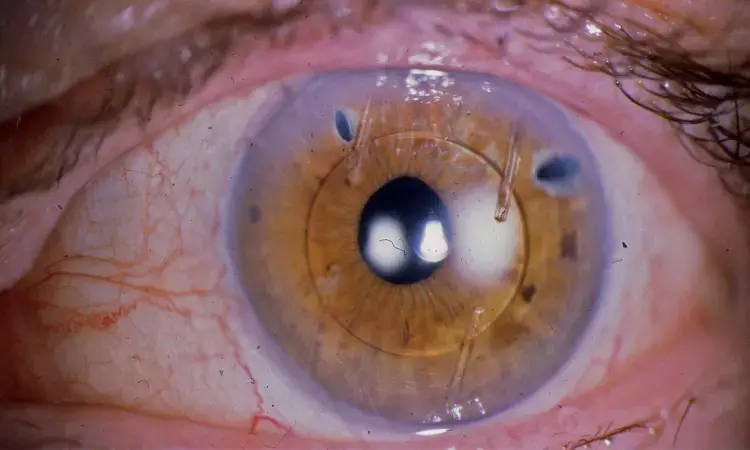- Home
- Medical news & Guidelines
- Anesthesiology
- Cardiology and CTVS
- Critical Care
- Dentistry
- Dermatology
- Diabetes and Endocrinology
- ENT
- Gastroenterology
- Medicine
- Nephrology
- Neurology
- Obstretics-Gynaecology
- Oncology
- Ophthalmology
- Orthopaedics
- Pediatrics-Neonatology
- Psychiatry
- Pulmonology
- Radiology
- Surgery
- Urology
- Laboratory Medicine
- Diet
- Nursing
- Paramedical
- Physiotherapy
- Health news
- Fact Check
- Bone Health Fact Check
- Brain Health Fact Check
- Cancer Related Fact Check
- Child Care Fact Check
- Dental and oral health fact check
- Diabetes and metabolic health fact check
- Diet and Nutrition Fact Check
- Eye and ENT Care Fact Check
- Fitness fact check
- Gut health fact check
- Heart health fact check
- Kidney health fact check
- Medical education fact check
- Men's health fact check
- Respiratory fact check
- Skin and hair care fact check
- Vaccine and Immunization fact check
- Women's health fact check
- AYUSH
- State News
- Andaman and Nicobar Islands
- Andhra Pradesh
- Arunachal Pradesh
- Assam
- Bihar
- Chandigarh
- Chattisgarh
- Dadra and Nagar Haveli
- Daman and Diu
- Delhi
- Goa
- Gujarat
- Haryana
- Himachal Pradesh
- Jammu & Kashmir
- Jharkhand
- Karnataka
- Kerala
- Ladakh
- Lakshadweep
- Madhya Pradesh
- Maharashtra
- Manipur
- Meghalaya
- Mizoram
- Nagaland
- Odisha
- Puducherry
- Punjab
- Rajasthan
- Sikkim
- Tamil Nadu
- Telangana
- Tripura
- Uttar Pradesh
- Uttrakhand
- West Bengal
- Medical Education
- Industry
Scleral contact lenses associated with good visual outcomes in children with aphakia

Israel: According to a study published in Eye Journal, researchers have concluded that in aphakic children, Scleral contact lenses are the most effective means of visual rehabilitation following lensectomy. These are suitable for long-term usage, they mentioned.
In aphakic children, timely management is critical for rehabilitating visual gain adequately. Researchers used data to review the mentioned background evaluating the long-term efficacy of scleral contact lenses. They collected data which recorded aphakic refraction and visual acuity, complications and compliance to lens wear based on the feedback given by the parents on every clinical visit.
The study results could be summarised as follows:
- 76% of cases, with final best corrected visual acuity or BCVA of 20/40 or better achieved in seventeen eyes, constituting 34%.
- The rate of amblyopia was 50%.
- 56 % of children developed Strabismus.
- Researchers recorded less favourable visual outcomes of 0.43 ± 0.4 LogMAR without Strabismus and 0.8 ± 0.5 LogMAR with Strabismus.
- During the follow-up period, No corneal infections were reported.
- Sixteen children had superficial punctate keratopathy as the main adverse effect on the ocular surface.
- 96 % of cases, including 48 children, displayed good Compliance, with two cases being the exception.
- Scleral lenses were tolerated well by all children.
Veronika Yehezkeli from the Department of Ophthalmology, Meir Medical Center, was the study's lead researcher.
The team said Scleral contact lenses are effective in aphakic children after lensectomy. They are suitable to be used long-term with good compliance with wear.
Further concluding, they clarified that they reported excellent visual outcomes in the study. Furthermore, adverse events were well-tolerable.
Further reading:
Yehezkeli, V., Hare, I., Moisseiev, E. et al. Assessment of long-term visual outcomes in aphakic children wearing scleral contact lenses. Eye 37, 421–426 (2023). https://doi.org/10.1038/s41433-022-01942-6
BDS, MDS in Periodontics and Implantology
Dr. Aditi Yadav is a BDS, MDS in Periodontics and Implantology. She has a clinical experience of 5 years as a laser dental surgeon. She also has a Diploma in clinical research and pharmacovigilance and is a Certified data scientist. She is currently working as a content developer in e-health services. Dr. Yadav has a keen interest in Medical Journalism and is actively involved in Medical Research writing.
Dr Kamal Kant Kohli-MBBS, DTCD- a chest specialist with more than 30 years of practice and a flair for writing clinical articles, Dr Kamal Kant Kohli joined Medical Dialogues as a Chief Editor of Medical News. Besides writing articles, as an editor, he proofreads and verifies all the medical content published on Medical Dialogues including those coming from journals, studies,medical conferences,guidelines etc. Email: drkohli@medicaldialogues.in. Contact no. 011-43720751


